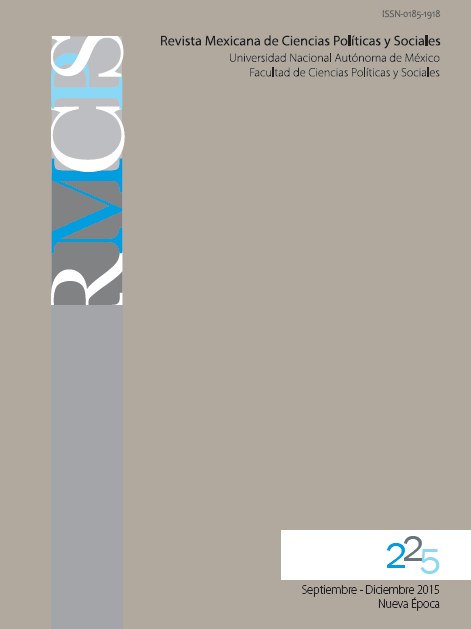A non-endogenous method to measure campaign spending in Chile, 2005-2009
Main Article Content
Abstract
Downloads
Article Details
Citas en Dimensions Service
References
Abramowitz, Alan, (1991) “Incumbency, Campaign Spending, and the Decline of Competition in US House Elections” en Journal of Politics. Vol. 53, núm. 1, pp. 34-56. Cambridge, Cambridge University Press.
Agostini González, Claudio, (2012) “Financiamiento de la política en Chile. Campañas electorales de 2009-2010” en Díaz, Francisco y Sierra, Lucas (eds.), Democracia con Partidos. Informe para la reforma de los partidos políticos en Chile. Santiago, CEP/CIEPLAN, pp. 269-319.
Ansolabehere, Stephen y Gerber, Alan, (1994) “The Mismeasure of Campaign Spending: Evidence from the 1990 US House Elections” en Journal of Politics. Vol. 56, núm. 4, pp. 1106-1118. Cambridge, Cambridge University Press.
Cox, Gary y Thies, Michael, (2000) “How Much Does Money Matter? “Buying” Votes in Japan, 1967-1990” en Comparative Political Studies. Vol. 33 (1), pp. 37-57. Londres, SAGE Publications.
Edwards, Santiago; Morales, Mauricio; y Schuster, Martín, (2012) “¿El dinero hace la felicidad? Efecto del gasto en campañas sobre el desempeño electoral de los candidatos a alcalde en Chile 2004-2008” en Morales, Mauricio y Navia, Patricio (eds.), Democracia Municipal en Chile, 1992-2012. Santiago, Ediciones Universidad Diego Portales.
Erikson, Robert y Palfrey, Thomas, (1998) “Campaign Spending and Incumbency: An Alternative Simultaneous Equations Approach” en The Journal of Politics. Vol. 60, núm. 02, pp. 355-373. Cambridge, Cambridge University Press.
Evans, Thomas, (2007) “An Empirical Test of Why Incumbents Adopt Campaign Spending Limits” en Public Choice. Vol. 132, núm. 3, pp. 437-456. Nueva York, Springer.
Ferejohn, John, (1977) “On the Decline of Competition in Congressional Elections” en American Political Science Review. Vol. 71, pp. 166-176. California, Stanford Unviersity Press.
Geddes, Barbara, (1990) “How the Cases you Choose Affect the Answers You Get: Selection Bias in Comparative Politics” en Political Analysis. Vol. 2, pp. 131-150. Oxford, Oxford University Press.
Gelman, Andrew y Gary, King, (1990) “Estimating Incumbency Advantage Without Bias” en American Journal of Political Science. Vol. 34, núm. 11, pp. 42-64. Cambridge, Harvard University Press.
Jacobson, Gary, (1978) “The Effects of Campaign Spending in Congressional Elections” en The American Political Science Review, pp. 469-491. California, Stanford Unviersity Press.
Jacobson, Gary, (1990) “The Effects of Campaign Spending in House Elections: New Evidence for Old Arguments” en American Journal of Political Science, pp. 334-362. Cambridge, Harvard University Press.
Johnson, Joel, (2011) “Incumbents without a Campaign Finance Advantage: Competition and Money in Chile’s Congressional Elections” en Journal of Politics in Latin America. Vol. 3, núm. 3, pp. 3-33. Hamburgo, GIGA.
King, Gary, (1991) “Constituency Service and Incumbency Advantage” en British Journal of Political Science. Vol. 21, núm. 1, pp. 119-128. Cambridge, Cambridge University Press.
Mareek, Phillippe, (1997) Marketing político y comunicación: claves para una buena información política. Madrid, Paidós.
Morales, Mauricio y Rafael Piñeiro, (2010) “Gasto en campaña y éxito electoral de los candidatos a diputados en Chile 2005” en Revista Ciencia Política. Vol. 3, núm. 3, pp. 645-667. Santiago, Universidad Católica de Chile.
Palda, Filip, (2000) “Regulación del financiamiento electoral en Chile: lecciones de Canadá y los Estados Unidos” en Estudios Públicos. Vol. 74. Santiago, Centro de Estudios Públicos.
Samuels, David, (2001) “Does money matter? Credible Commitments and Campaign Finance in New Democracies: Theory and Evidence from Brazil” en Comparative Politics, vol. 34, núm. 1, pp. 23-42.
Urcuyo Cossío, Luis y Emilio Moya Díaz, (2009) Control del financiamiento y gasto electoral en Chile. Santiago, Chile Transparente.
Valdés, Salvador, (2003) “Manual de buenas prácticas para donaciones políticas” en Puntos de Referencia. Vol. 272. Santiago, Centro de Estudios Públicos.

La Revista Mexicana de Ciencias Políticas y Sociales publicada por la Universidad Nacional Autónoma de México se distribuye bajo una Licencia Creative Commons Atribución-NoComercial-SinDerivar 4.0 Internacional.
Basada en una obra en http://www.revistas.unam.mx/index.php/rmcpys/
La RMCPyS autoriza a sus colaboradores que suban una copia de sus trabajos publicados en sus webs personales o en cualquier repositorio de acceso abierto, siempre y cuando se mencione específicamente a la Revista Mexicana de Ciencias Políticas y Sociales como fuente original de procedencia, citando el año y número del ejemplar respectivo y añadiendo el enlace a la página web donde este órgano editorial puede ser consultado in toto, de manera abierta y gratuita en: <www.revistas.unam.mx/index.php/rmcpys>.
Las y los lectores tienen libertad para:
Compartir, copiar y redistribuir el material en cualquier medio o formato.
El licenciante no puede revocar estas libertades en tanto usted siga los términos de la licencia.
De acuerdo con los siguientes términos:
- Atribución: la/el lector/a debe reconocer el crédito de una obra de manera adecuada, proporcionar un enlace a la licencia, e indicar si se han realizado cambios. Puede hacerlo en cualquier forma razonable, pero no de forma tal que sugiera que tiene el apoyo del licenciante o lo recibe por el uso que hace.
- No comercial: la/el lector/a no puede hacer uso del material con fines comerciales.
- Si se mezcla, transforma o se desarrolla a partir de la obra licenciada, no se permite la distribución del material modificado.
Cargos por gestión de artículos
La Revista Mexicana de Ciencias Políticas y Sociales NO cobra tarifas por recibir, procesar o publicar los artículos (Article Processing Charge [APC]) enviados por los autores.





